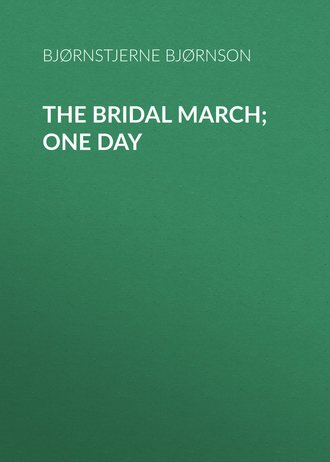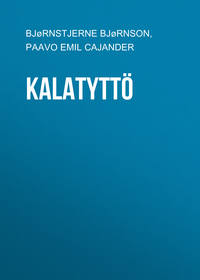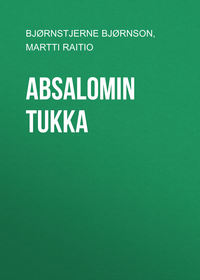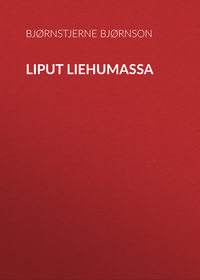 полная версия
полная версияThe Bridal March; One Day
Demonstrations of admiration and respect followed, much parade and many speeches, mingled with witticisms over his size and her smallness. This lasted from five in the evening till after midnight, in rather mixed company. As time wore on, and the champagne continually flowed, many of the guests became boisterous and somewhat intrusive, and among them the bridegroom.
The next morning, at seven o'clock, Ella sat dressed and alone, in a room next to their bedroom, the door of which stood open. From it she could hear her husband's snores. She sat there still and deadly pale, without tears and without feeling. She divided the occurrences into two—what had happened and what had been said; what had been said and what had happened: she did not know which was the worst. This man's longing had been inflamed by deadly hate. From the time that she had said No! he had made it the object of his life to force her to say Yes! He told her that she should pay for having nearly made him ridiculous a third time. She should pay for it all—she, who had dared to make insulting conditions. He would break the neck of her conditions like a shrimp. Let her try to refuse to go on board with him, or attempt to control anything herself.
Then that which had happened. A fly caught in a spider's web, that was what she thought of.
But had she not experienced such a feeling once before? O God, the night of the ball! She had a vague feeling that that night had fore-doomed her to this; but she could not make it clear to herself. On the other hand, she asked herself if what we fail in has not a greater influence on our lives than that which we succeed in.
Three or four hours after this, Hjalmar Olsen sat at the breakfast-table; he was dull and silent, but perfectly polite, as though nothing had happened. Perhaps he had been too drunk to be quite accountable, or it might be that his politeness was calculated with the hope of inducing her to come with him and visit his ship. He asked her to do so, as he left the table, but neither promises nor threats could induce her to go on board even for the shortest time. Her terror saved her.
Some months later an announcement appeared in the papers that she wished to take pupils both for the piano and book-keeping. She was once more living in her own little house in her native town. She was at this time enciente.
One day an old friend of Aksel Aarö's came to see her; he was to remember Aarö very kindly to her, and to congratulate her on her marriage. She controlled her rising emotion, and asked quietly how he was getting on. Most wonderfully; he was still living with the same old man, to whom, by degrees, he had entirely devoted himself. This was the very thing for Aarö: it suited him to devote himself completely to one person. He had gone through a course of treatment for his inherited failing and believed himself to be cured.
"And how is Fru Holmbo?" asked Ella. She was frightened when she had said it, but she felt an intense bitterness which would break out. She had noticed how thin and pale Fru Holmbo looked—she evidently missed Aarö, and that was too much!
The friend smiled: "Oh! have you heard that silly rumour? No, Aksel Aarö was only the medium between her and the man to whom she was secretly attached. The two friends had lived together abroad. Some months ago there had been a talk about a business journey to Copenhagen, and Fru Holmbo went there also. But there had undoubtedly been something between them for a long time."
That night Ella wept for a long time before she fell asleep. She lay and stroked her plait, which she had drawn on to her bosom. She had often thought of cutting it off, but it was still there.
CHAPTER IV
In the course of the two first years of her marriage she had two children. Whenever she was alone, she divided her time between them and her teaching. Her husband hardly contributed anything to the household, except during the brief periods that he passed at home, and then the money was squandered in the extravagant life which he led with his companions. During these visits the "young ones" were sent off to their aunt. "One could not take four steps without going through the walls of this wretched little house," he said. At these times she also gave up the lessons; she had no time for anything except to wait on him.
Every one realised that she could not be happy, but no one suspected that her whole life was one of dread—dread of the telegram which would announce his coming, if only for a few days, dread of what might happen when he came. When he was there she never attempted to oppose him, but displayed to him, and every one else, those frank eyes and quick, but quiet, ways which enabled her to come and go without being noticed. When he was gone, she would suddenly collapse, and, worn out with the strain of days and nights, be obliged to take to her bed.
Each time that he came home he kept less guard over himself, and was more careless as regarded others. Had she known that men who have expended their strength as he had done are as a rule worn out at forty—and many such are to be found in the coast-towns—she would have understood that these very things were signs of failure. He had advanced far along the road. To her he only appeared more and more disgusting. He was but little at home, which helped her. She had determined that she and her boys should live in the best manner, and this again was a help to her; but more than all was her constant employment and the regard which every one felt for her. After five years of marriage she looked as charming as ever, and appeared as cheerful and lively; she was accustomed to conceal her feelings.
Her children were now—the elder four, the second three years old. They were rarely seen anywhere but in the market-place, on the snow-heaps in winter and on the sand-heaps in summer, or else they were in the country with their aunt whom they had adopted as "grandmother."
Next to the care of the little boys, flowers were Ella's greatest delight. She had a great many, which made the house appear smaller than it really was. She could play with the boys, but she could share her thoughts with the flowers. When she watered them, she felt acutely how much she suffered. When she dried their leaves, she longed for pleasant words and kindly eyes. When she removed dead twigs and superfluous shoots, when she re-potted them, she often cried with longing; the thought that there was no one to care for her overcame her.
Five years were gone, then, when one day it was reported through the whole town that Aksel Aarö had become a rich man. His old friend was dead and had left him a large annuity. It was also said that he had been a second time treated for dypsomania. The previous treatment had not been successful, but he was now cured. One could see how popular Aarö was, for there was hardly anybody who was not pleased.
On Wednesday the 16th of March, 1892, at four o'clock in the afternoon, Ella sat at work near her flowers; from there she could see the hotel. At the corner window in the second story stood the man of whom she was thinking—stood and looked down at her.
She got up and he bowed twice. She remained standing as he crossed the market-place. He wore a dark fur cap, and his fair beard hung down over his black silk waistcoat. His face was rather pale, but there was a brighter expression in his eyes. He knocked, she could not speak or move, but when he opened the door and came into the room, she sank into a chair and wept. He came slowly forward, took a chair and sat down near her. "You must not be frightened because I came straight to you, it is such a pleasure to see you again." Ah! how they sounded in this house, those few words full of consideration and confidence. He had acquired a foreign accent, but the voice, the voice! And he did not misconstrue her weakness, but tried to help her. By degrees she became her old self, confiding, bright, timid.
"It was so entirely unexpected," she said.
"All that has occurred in the meantime rushes in on one," he added courteously.
Not much more was said. He was preparing to leave, when his brother-in-law entered. Aarö looked at her boys out on the snow-heap, he looked at her flowers, her piano, her music, then asked if he might come again. He had been there hardly five minutes, but an impression rested on her mind somewhat as the magnificent fair beard rested on the silk waistcoat. The room was hallowed, the piano, the music, the chair on which he had sat, even the carpet on which he had walked—in his very walk there was consideration for her. She felt that all that he had said and done showed sympathy for her fate. She could do nothing more that day, she hardly slept during the night, but the change which had taken place in her was nothing less than the bringing of something into the daylight again from five years ago, from six years indeed, as one brings flowers out of the cellar, where they have been put for their winter sleep, up into the spring-time again. As this thought passed through her mind, she made the same gesture at least twenty times, she laid both hands on her breast, one over the other, as though to control it: it must not speak too loudly.
The next day their conversation flowed more freely. The children were called in. After looking at them for a while, he said: "You have something real there."
In a little time they were such good friends, he and the boys, that he was down on all-fours playing horses with them, and did some quite new tricks which they thought extremely amusing; he then invited them to come for a drive the next day. After a thaw, there had been an unusually heavy fall of snow; the town was white and the state of the roads perfect.
Before he left Ella offered to brush him; the carpet had not been as well swept as it should have been. He took the clothes-brush from her and used it himself, but he had unfortunately lain on his back as well, so she was obliged to help him. She brushed his coat lightly and deftly, but she was never satisfied, nor was he yet properly brushed in front. He had to do it over again: she stood and looked on. When he had finished she took the brush into the kitchen.
"How funny that you should still wear your plait," said he, as she went out. She remained away for some time, and came in again by another door. He had gone. The children said that some one had come across for him.
The next morning the little boys had their drive. They did not return until late in the afternoon. They had been to Baadshaug, a watering-place with an hotel and an excellent restaurant, to which people were very fond of making excursions during the winter. His sister's youngest boy was with them, and while all three went back with the horses to "Andresen's at the corner," Aarö remained standing in the passage. Never had Ella seen him so cheerful. His eyes sparkled, and he talked from the time he came to the time he left. He talked about the Norwegian winter which he had never realised before; how could that have been? For many years he had had in his répertoire a song in praise of winter, the old winter song which she knew as well: "Summer sleeps in winter's arms"—yes, she knew it—and he only now realised how true it was. The influence of winter on people's lives must be immense; why it was nearly half their lives; what health and beauty and what power of imagination it must give. He began to describe what he had seen in the woods that day. He did not use many words, but he gave a clear picture; he talked till he became quite excited, and looked at her the whole time with a rapturous expression.
It was but for a few moments. He stood there muffled in furs: but when he had gone it seemed to her that she had never truly seen him before. He was an enthusiast then—an enthusiast whose depths never revealed themselves. Was his singing a message from this enthusiasm? Was this why his voice carried everybody away with it into another region? That melancholy father of his, when a craving for drink seized him, would shut himself up with his violin, and play and play till he became helpless. Had the son, too, this dislike of companionship, this delight in his own enthusiasm? God be praised, Aksel Aarö was saved! Was it not from the depths of his enthusiasm that he had looked at her? This forced itself upon her for the first time; she had been occupied before by the change in him, but now it forced itself upon her—hotly, with a thrill of fear and joy. A message of gladness which still quivered with doubt. Was the decisive moment of her life approaching? She felt that she coloured. She could not remain quiet; she went to the window to look for him; then paced the room, trying to discover what she might believe. All his words, his looks, his gestures, since he had first come there, rose before her. But he had been reserved, almost niggardly, with them. But that was just their charm. His eyes had now interpreted them, and those eyes enveloped her; she gave herself absolutely up to them.
Her servant brought in a letter; it was a Christmas card, in an envelope without a direction, from Aksel Aarö—one of the usual Christmas cards, representing a number of young people in snow-shoes. Below was printed:
Winter white,Has roses red.On the other side, in a clear round hand, "In the woods to-day I could not but think of you. A. A.." That was all.
"That is like him, he says nothing more. When he passes a shop-window in which he sees such a card, he thinks of me; and not only does he think of me but he sends me his thoughts." Or was she mistaken. Ella was diffident; surely this could not be misconstrued. The Christmas card—was it not a harbinger? The two young couples on it and the words—surely he meant something by that. His enraptured eyes again rose before her; they seemed not only to envelop her, but to caress her. She thought neither of past nor future; she lived only in the present. She lay wide awake that night looking at the moonlight. Now, now, now, was whispered. Had she but clung to the dream of her life, even when the reality had seemed so cruel, she would have held her own; because she had been uncertain about it, all had become uncertain. But the greater the suffering had been, the greater, perhaps, would be the bliss. She fell asleep in the soft white light, which she took with her into her dreams. She woke among light, bright clouds, which gathered round the glittering thought of what might be awaiting her to-day. He had not said a word. This bashfulness was what she loved the best of anything in him. It was just that which was the surest pledge. It would be to-day.
CHAPTER V
She took a long time over her bath, an almost longer time in doing her hair; out of the chest of drawers, which she had used as a child, and which still stood in its old place—out of its lowest drawer she took her finest underlinen. She had never worn it but once—on her wedding-day—before the desecration, never since. But to-day—Now, now, now! Not one garment which she put on had ever been touched by any one but herself. She wished to be what she had been in her dreams.
She went to the children, who were awake but not dressed.
"Listen, boys! To-day Tea shall take you to see grandmother."
Great delight, shared by Tea, for this meant a holiday.
"Mamma, mamma!" she heard behind her, as she ran down to the kitchen to get a cup of coffee, and then she was off. First she must get some flowers, then put off her lessons. For now, now, now!
Out in the street she remembered that it was too early to get anything, so she went for a walk, beyond the town, the freshest, the brightest, that she had ever taken. She came back again just as Fru Holmbo was opening her shop. As Ella entered the "flower-woman" was holding an expensive bouquet in her hand, ready to be sent out.
"I will have that!" cried Ella, shutting the door behind her.
"You!" said Fru Holmbo a little doubtfully; the bouquet was a very expensive one.
"Yes, I must have it;" Ella's little green purse was ready. The bouquet had been ordered for the best house in the town, and Fru Holmbo said so.
"That does not matter," answered Ella. Such genuine admiration of a bouquet had never been seen—and Ella got it.
From there she went to "Andresen's at the corner." One of the shopmen took lessons in book-keeping from her. She wished to put him off, and asked him to tell the whole of the large class. She asked him this with kindling eyes, and he gladly promised to do so. The daintiest red shawl was hanging just before her. She must have it to wear over her head to-day when she drove out; for that she would drive to-day there was no doubt. Andresen himself came up, just as she was asking about the shawl. He caught a glimpse of her bouquet, under the paper. "Those are lovely roses," he said. She took one out at once, and gave it to him. From the rose he looked at her; she laughed and asked if he would take a little off the price of the shawl; she had not quite enough money left.
"How much have you?" he asked.
"Just half a krone too little," she replied.
He himself wrapped up the shawl for her. In the street she met Cecilie Monrad, whose sister studied music with Ella; she was thus saved a walk to the other end of the town to put her off. "Everything favours me to-day," she thought.
"Did you see about those two who committed suicide together at Copenhagen?" asked Cecilie.
"Yes, she had." Fröken Monrad thought that it was horrible.
"Why?"
"Why the man was married!"
"True enough," answered Ella, "but they loved each other." Her eyes glowed; Cecilie lowered hers and blushed. Ella took her hand and pressed it. "I tumbled into a love-story there," she thought, and flew, rather than walked, up to the villas, where most of her pupils lived. On a roof she saw two starlings; the first that year. The thaw of a few days back had deceived them. Not that the starlings were dispirited. No, they loved! "Mamma, mamma," she seemed to hear at the same moment. It was certainly her boys; she had thought of them when she saw the starlings. She was so occupied with this that she walked right across to the side of the road and trod on a piece of board, which tilted up and nearly threw her down; but under the board Spring reigned. They had come with the thaw, they were certainly dandelions! However ugly they may be in the summer, the first ones are always welcome. She stooped down and gathered the flowers; she put them with the roses. The dandelions looked very shabby there, but they were the first this year, and found to-day!
After this she was absolutely boisterous. She skipped down the hills when her errand was finished. She greeted friends and mere acquaintance alike, and when she again saw Cecilie she put down the flowers, made a snowball, and threw it at her back.
When she got home she wrapped the children well up and put them into the sledge with Tea. "Mamma, mamma!" they shouted and pointed up towards the hotel. There stood Aksel Aarö. He bowed to her.
Soon afterwards he came across. "You are quite alone," he said as he entered.
"Yes." She was arranging the flowers and did not look up for she was trembling.
"Is it a birthday to-day?" he asked.
"Do you mean because of the flowers?"
"Yes. What lovely roses, and those in the glass—dandelions?"
"The first this year," she answered.
He did not look at them. He stood and fidgeted, as though he were thinking of something.
"May I sing to you?" He said at last.
"Yes, indeed." She left the flowers, in order to open the piano and screw down the music-stool, and then drew quietly back.
After a long and subdued prelude, he began with the "Sunset Song," by Ole Olsen, very softly, as he had spoken and moved ever since he came in. Never had he sung more beautifully; he had greatly improved, but the voice was the same, nay, there was even more despair and suffering in it than when she had heard it for the first time. "Sorrow, sorrow, oh, I am lost!" She heard it again plainly. At the end of the first verse, she sat bending forward, and weeping bitterly. She had not even tried to control herself. He heard her and turned round, a moment afterwards she felt him approach her, it even seemed to her that he kissed her plait, certainly he had bent down over her, for she could feel his breath. But she did not raise her head, she dare not.
He walked across the room, returned and then walked back again. Her agitation subsided, she sat immovable and waited.
"May I be allowed to take you for a drive to-day?" she heard him say.
She had known the whole morning that they would go for a drive together, so she was not surprised. Just as that had now been fulfilled, so would the other be—everything. She looked up through her tears and smiled. He smiled too.
"I will go and see about the horses," he said, and as she did not answer he left her.
She went back to the flowers. So she had not been able to give them to him. She would throw away the dandelions. As she took them out of the glass, she recalled the words, "You have something real there." They had certainly not been said about the dandelions, but they had often since recurred to her. Was it strange that they should do so now? She let the dandelions remain.
Aarö stayed away a long time, more than an hour, but when he returned he was very cheerful. He was in a smart ladies' sledge, in the handsome furs which he had worn the day before; the most valuable ones that she had ever seen. He saluted with his whip, and talked and laughed with every one, old and young, who gathered round him while Ella put on her things. That was soon done; she had not many wraps, nor did she need them.
He got down when she appeared, came forward, muffled her up and drove off at a trot. As they went he stooped over her and whispered, "How good of you to come with me." His voice was very genial, but there was something quite different about his breath. As soon as the handsome horses had slackened speed, he stooped forward again.
"I have telephoned to Baadshaug to order lunch, it will be ready when we get there; you do not mind?"
She turned, so as to raise her head towards him, their faces almost met.
"I forgot to thank you for the card yesterday."
He coloured. "I repented afterwards," he said, "but at the moment, I could not but think of you; how you suit it out here." Now she coloured and drew back. Then she heard close by her: "You must not be angry, it always happens that when we wish to repair a blunder, we make another."
She would have liked to have seen his eyes, as he said this, but she dare not look at him. At all events it was more than he had said up to the present time. His words fell softly on her ears. Before to-day she had almost misinterpreted his reserve, but how beautiful it made everything. She worshipped it.
"In a little time we shall come to the woods, then we will stop and look round us," he said.
"There," she thought.
He drove on at a quick trot. How happy she was! The sunlight sparkled on the snow, the air was warm, she had to loosen the shawl over her head, and he helped her to do so. Again she became aware of his breath, there was something, not tobacco, more delicate, pleasanter, but what was it? It seemed to harmonise with him. She felt very happy, with an overflow of joy in the scene through which they were driving and which continually increased in beauty.
On one side of the road were the mountains, the white mountains, which took a warm tint from the sunlight. In front of the mountains were lower hills, partly covered by woods, and among these lay scattered farms. The farms were soon passed and then came woods, nothing but woods. On the other side of the road they had the sea for the whole way, but between them and it were flat expanses, probably marshes. The sea looked steel-grey against the snow. It spoke of another part of life, of eternal unrest; protest after protest against the snow idyl.
During the thaw, tree-trunks, branches, and fences had become wet. The first snow which fell, being itself wet, had stuck to them. But when all this froze together, and there was another overwhelming fall, outlines were formed over the frozen surface, such as one rarely sees the like of. The weight of the first soft snow had caused it to slip down, but it had been arrested here and there by each inequality, and there it had collected, or else it had slid under the branches, or down on both sides of the fences; when this had been augmented both by drift and fall, the most whimsical animal forms were produced—white cats, white hares clawed the tree-trunks with bent backs and heads and fore-quarters outstretched, or sat under the branches, or on the hedges. White beasts were there, some appeared the size of martens, but occasionally they seemed as large as lynxes or even tigers; besides these there were numberless small animals, white mice, and squirrels, here, there, and everywhere. Again there were, besides, all sorts of oddities, mountebanks who hung by their heels, clowns and goblins on the tops of the fences, dwarfs with big sacks on their backs; an old hat or a nightcap: an animal without a head, another with a neck of preposterous length, an enormous mitten, an overturned water-can. In some places the blackened foliage remained uncovered, and formed arabesques against the drifts; in others, masses of snow lay on the branches of the fir-trees with green above and beneath, forming wonderful contrasts of colour. Aarö drew up and they both got out of the sledge.









